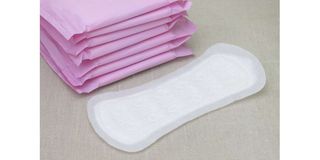NGOs: Period poverty ruining learning in West Pokot

Sanitary towels. Many girls in remote parts of West Pokot skip lessons because of period poverty.
What you need to know:
- Many girls experience hardship and cannot get sanitary towels, a situation that leads to absenteeism from school as they suffer low morale.
- Declares Inspiration Group has, therefore, called on the national and county governments and NGOs to help schoolgirls with sanitary towels, for them to learn well.
Many girls in West Pokot County miss lessons for four days every month because of lack of sanitary towels, meaning they miss 36 days of the nine months they are supposed to be in school, non-governmental organisations (NGOs) have revealed.
Many girls in remote areas experience hardship and cannot get sanitary towels, a situation that undermines their education as they suffer low morale.
Declares Inspiration Group executive director Jefferson Mudaki has, therefore, called on the national and county governments and NGOs to help schoolgirls with sanitary towels, for them to learn well.
Speaking on Tuesday in Kapenguria during a reproductive health programme meeting, Mr Mudaki said a sanitary towel is a necessity, especially for girls learning in remote areas, which had been marginalised for a long time.
Call to action
He called for measures that will help girls get sanitary towels and urged leaders to intervene. “Many girls sit at home because they lack sanitary towels. We, as leaders, must intervene to address this problem,” he said.
“As learners need books and pens, girls need sanitary towels. We want them to have many so that they learn well.”
Also read: Sex for sanitary towels, food
Mr Mudaki said many parents don’t know the importance of the commodity and some lack money to buy it for their children. “Many parents are illiterate hence don’t understand the importance of sanitary towels. The national government and the county should chip in and help the girls.”
Pendo Africa executive director Faith Tanui called appealed to the county government to set aside funds for buying and distributing sanitary towels. “One towel costs Sh40-50.”
She said many schools are mixed, hence girls fear going for lessons during their menses. “In many areas you can travel over 50 kilometres without coming across a shop that sells sanitary towels. This had discouraged many girls from attending school. CDF was forced to chip in and rescue the girl.”
The NGOs now provide essential training in menstrual hygiene and create awareness of the importance of proactively managing reproductive health for girls to remain in school and improve options for the future. “We empower girls by giving them pads to ensure they stay in school during their periods,” Ms Tanui said.
She explained that they provide girls with sustainable economic solutions. “There is hope and we shall work out solutions for you. You should not feel that it is the end of life. We emphasise menstrual hygiene, encourage girls not to go to other businesses or leave school because of menstrual health.”
Suffering
Ms Tanui said financial difficulties make it even harder for women and girls to access sanitary products. “The Covid-19 pandemic affected the ability of women and girls to buy sanitary products.”
She said they are also dispelling myths about menstrual cycle. “They opt to hide because of the flowing blood. We want to break a taboo, begin a concern that it is normal and they should not feel ashamed.”
Also read: Make sanitary towels widely affordable
Ms Tanui said girls in pastoral areas cannot manage their periods safely or with dignity, leading to stigma. “It is hard for them to afford sanitary pads at their doorsteps because of distance. Pads will enable them to stay in school and boost their self-esteem. We are passionate about empowering young people on mentorship, integrating teenage mothers back to school and rehabilitation.”
She noted that they target to donate 3,000 pads to protect girls from falling victim to sex pests, who take advantage of their period poverty to ‘help’ them get pads.





